Text

Liverpool Trans Front by Sam/ Pom Pom Issue One: "Change"
0 notes
Text
Warm Snow (by Ash)

"Sometimes, I just want to stay in bed
cuddled up under the duvet, binge watching TV
But up I get, my legs feel like lead,
And I pull on my comfiest enby cat hoodie
slip into my wooly rainbow socks
and knot my mum’s oldest, warmest scarf around my neck
I step out into the bitter wind, and my way to the docks
My wellies crunch merrily in the pure white snow
They haven’t been out in ages and I feel them grin
I get to the old stone tunnel and I crunch low
I can’t believe I used to be able to run under here
As a tiny kid, not even banging my head
when all my worries were so very mere
I’m really cold now as I sit on the wall
completely chilled to the bone
but it doesn’t bother me much
The snow is so beautiful, I’ve only ever seen it on my phone
There’s something magical about the way it falls
so I stick out my hand and touch a flake
and it’s not so cold at all! It’s warm!
Cautiously, I poke the pile with a rake
and the snow ripples as if I’ve chucked a pebble into the water
I drop happily into the snow, and it’s like a
bed, softer than a blanket and warm.
Gently, my eyes drift shut.
I’ll just rest for a while."
0 notes
Text
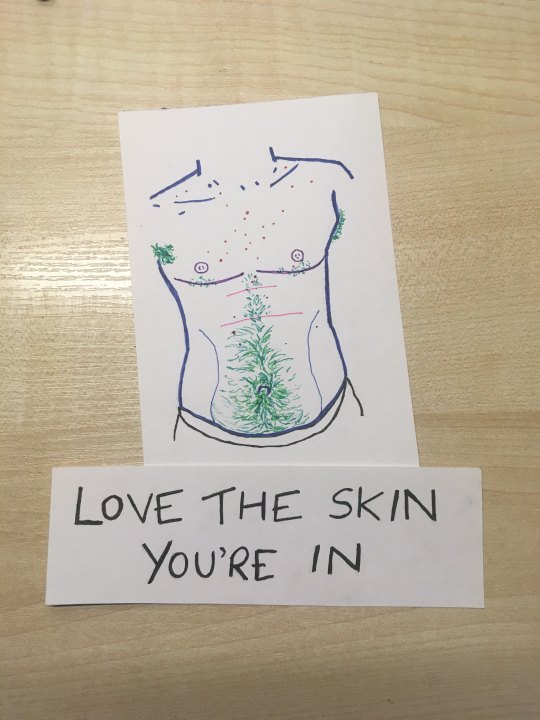
Love The Skin You're In by Lucas M/ Pom Pom Issue 1: "Change"
2 notes
·
View notes
Text
Nothing Feels Certain Anymore (by Lucy Butler)

"aside from the
snowdrops nuzzling their white, velvet snouts
through the dew-glazed dirt,
or the vegetables in my fridge
I swore I’d eat, eventually huddling
together in fuzzy blue and grey jumpers,
and the child next door
screaming and banging and crying all day
whilst I’m trying to write poetry,
or mother nature, every month
like those garish TV stylists, deciding my underwear’d
look just fabulous with a pop of colour.
The rain throwing a surprise shower
for your washing line,
wilting your trousers like cooked spinach,
the bin lorry
coughing and wheezing noisily along your street
every Wednesday before sunrise,
or the winter dark that
seeps like ink into our mornings and evenings
gradually washing away for luminant spring,
and the milky light of a new day
nuzzling it’s way through the dark,
like snowdrops growing through dirt.
0 notes
Text

"Change of Scene/Change of Mood" by Raf/ Pom Pom Issue One: "Change"
1 note
·
View note
Text

"Scratch Off The Old & Scream" by Soph / Pom Pom Issue 1: "Change"
21 notes
·
View notes
Text
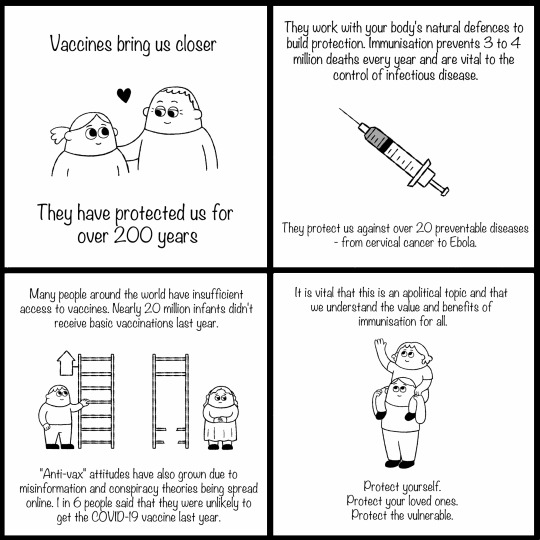
Bell Carr / Comics Youth @comicsyouth
"It's World Immunisation Week, which is especially important right now. Vaccines are a critical tool in ending the current pandemic and saving lives. An outbreak anywhere is a threat everywhere, so it's important for those who are able to access vaccines to get them.
Encourage those around you who may be unsure to use reliable sources of information only. Most misinformation and conspiracy theories have been spread through social media where 'fake news' is common - did you know that they profit an estimated £750 million per year through advertisement within anti-vaxxer groups?
Although there have been many campaigns to fight these attitudes, protests are still happening right now. It's important that as many of us as possible keep up to date with vaccinations for ourselves and children, to achieve herd immunity and prevent the return of currently controlled diseases.
There is a huge inequality in access to COVID-19 immunisation worldwide - only 4% of total vaccinations so far have been in developing countries, despite rich countries having the capacity to vaccinate everyone 3 times. The biggest vaccine companies are only producing enough for 1.5% of the global population right now, creating an artificial rationing for profit.
Immunisation is a key component of primary health care and brings us closer to a healthier future for all. Vaccines are a human right."
1 note
·
View note
Text
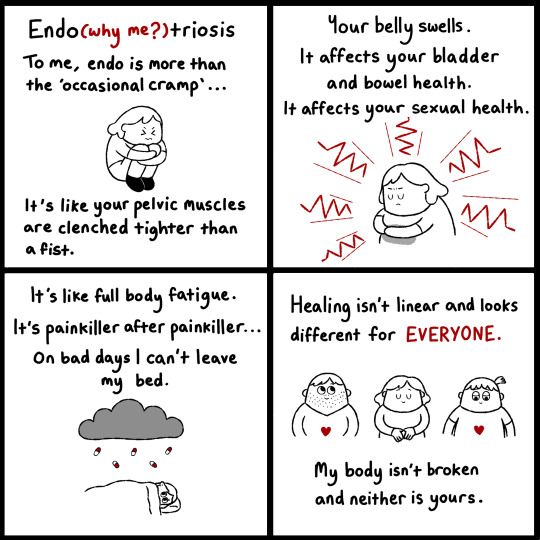
Bell Carr / Comics Youth @comicsyouth
“For the last week of endometriosis awareness month we’re sharing one person's lived experience of endo. No two people will have the exact same symptoms, so no two people will have the same treatment path. Never lose hope for yourself based on somebody else's experience:
What doesn't help one person could be life changing for you. If your doctors dismiss you, keep asking. If something isn't working for you, keep telling them. You're allowed to ask for help. Demand it! Your voice should be heard. Your body should be loved.”
1 note
·
View note
Text
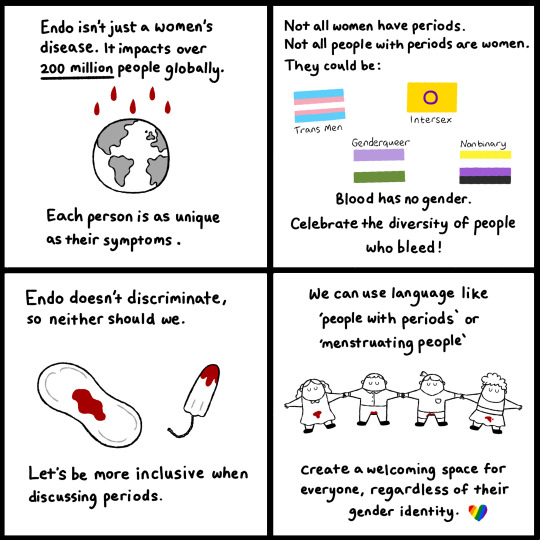
Bell Carr / Comics Youth @comicsyouth
"Endometriosis is a major illness that impacts people across society, but when discussing the subject of periods - the focus is often centred around women only. This excludes the experience of so many people who are going through the same thing but have a different gender identity - trans men, intersex people, genderqueer people, non-binary people. Endometriosis has even been found in cisgender men in rare cases.
It also implies that women are defined by their periods, and those who don't have them are no longer women. Regardless of a person's gender, endometriosis hurts just as much. Periods have just as much stigma. They are ignored by their doctors in the same way and left to cope without support for many years. The tying of periods to being a woman makes it even harder for those who identify as otherwise to talk about them.
It's important for all of us to be able to talk about periods more honestly, as this contributes to how long it takes a person to realise that their symptoms are abnormal. We can do this by using more inclusive language that isn't gender specific - we are just people with periods. Open up the conversation to allow every voice to be heard."
37 notes
·
View notes
Text
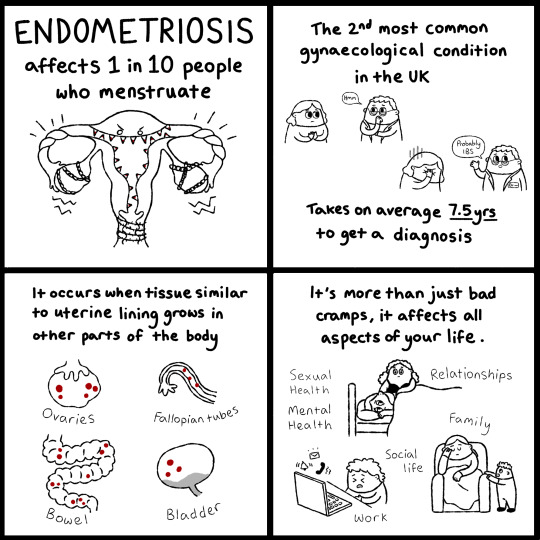
Bell Carr / Comics Youth @comicsyouth
"When tissue similar to the lining of the womb is found outside of the uterus, it causes an inflammatory reaction in the body which can lead to lesions and scar tissue. It can appear in many places - most commonly in the pelvis, ovaries, bladder and bowel. In rare cases it can affect the diaphragm and lungs. It can affect you from the very start of your reproductive years all the way up to menopause, but even then damage may be left behind.
The main symptoms are painful periods and ovulation, pain during/after sex, bleeding, chronic pain, fatigue and infertility in some. Symptoms can be mild, but most people with this condition experience debilitating pain. Due to lack of awareness and stigma surrounding periods, symptoms are often brushed off by the person experiencing them or doctors for years. There are short term treatments and surgeries to remove lesions, but no cure or known cause. It's more than just bad cramps."
0 notes
Text
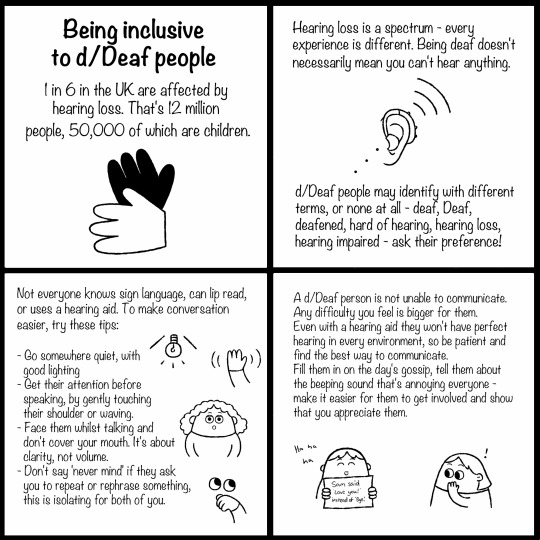
"There is no way of knowing how many d/Deaf people you interact with on a daily basis, as many have to adapt to communicate with others and may choose to hide their hearing impairment to avoid being treated differently. This can be especially difficult at the moment due to the implementation of masks and social distancing in most situations. Online video meetings are also common right now, which can be very difficult for those with hearing loss - make sure only one person speaks at a time, use closed captions, send out an agenda beforehand and a transcript afterwards so they don't miss anything.
Don't assume that a person can hear you, is able to lip read or uses a hearing aid - ask them how they prefer to communicate. Lip reading isn't easy, it's mostly based on context and can be made harder by different accents, facial hair, or someone not moving their mouth much when they speak.
Don't shout at a d/Deaf person, it's rude and can cause discomfort to those with hearing aids. If a person is struggling to understand what you're saying, it is an isolating experience if you give up and say 'it doesn't matter'. Be patient and ask which part they need you to repeat, if you should rephrase, or simply write/type it to them.
It's important for hearing people to understand the impact of language barriers and help d/Deaf people to feel supported rather than disadvantaged - at work, school or with friends."
16 notes
·
View notes
Text
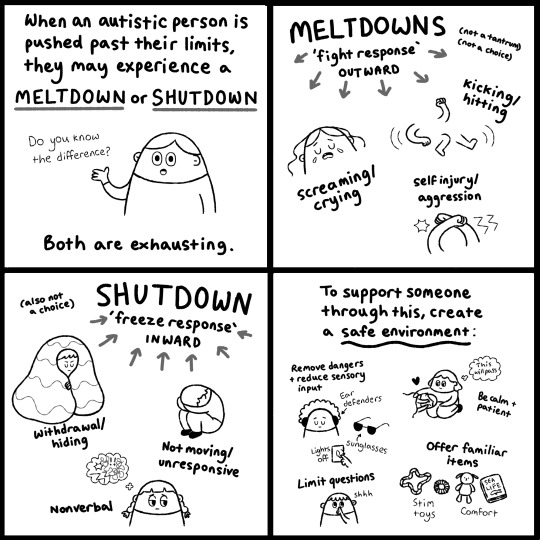
Bell Carr / Comics Youth @comicsyouth
“We all have our limits. Think of times when you've had a long hard day and all you want to do is go home - running through the station, it's busy and hot, the lights are too bright, everyone is in a rush, your phone is ringing - and then you see that you missed your train by 30 seconds.
You know there'll be another one in 10 minutes, but the weight of the day hits you all at once and you just need to sit down and cry. The emotion overwhelms you and demands to be felt, whether you like it or not.
For autistic people, the threshold for reaching this point is much lower, and the reaction it produces is very intense and out of their control. They may shout or stop communicating, lash out or sit very still. This is called a meltdown or a shutdown. A meltdown may be misjudged as simply a 'temper tantrum' in children, as they can appear similar - but they are not the same.
A tantrum is typically a way to protest something or get what you want, it has a purpose. Once the situation is resolved and attention is given, the child quickly recovers, and may not have been all that upset in the first place. A meltdown however, is completely involuntary and has no purpose. It's just as distressing for the one experiencing it as it is for those around them, wanting to calm down but not being able to.
Alternatively they may experience a shutdown, withdrawing into themselves to disconnect from all stimuli. Often, it is caused by a gradual build-up of stress - through sensory overload, sudden changes in routine, social interaction, too many questions/demands etc. These can pile up across a day, weeks, even a month until they finally reach breaking point and are completely overwhelmed by a situation. It may feel like a volcano erupting.
The final 'trigger' can be something small like an unexpected visitor or running out of your favourite snack, it may appear to be too trivial to cause so much upset - but it is an accumulation of many things leading up to that point. Not all autistic people have meltdowns or shutdowns, some have them rarely due to improved communication and boundaries. Adults can have them too, not just children.
A shutdown may be difficult to spot if that person is usually quiet anyway. They are often followed by exhaustion, as well as possible embarrassment and shame.
If someone in your life experiences meltdowns or shutdowns, during periods of calm it can be beneficial to discuss the best way for you to support them in the future. Everybody has different needs; some needing to be alone, some needing physical contact, but ALL needing love and understanding.”
148 notes
·
View notes
Text
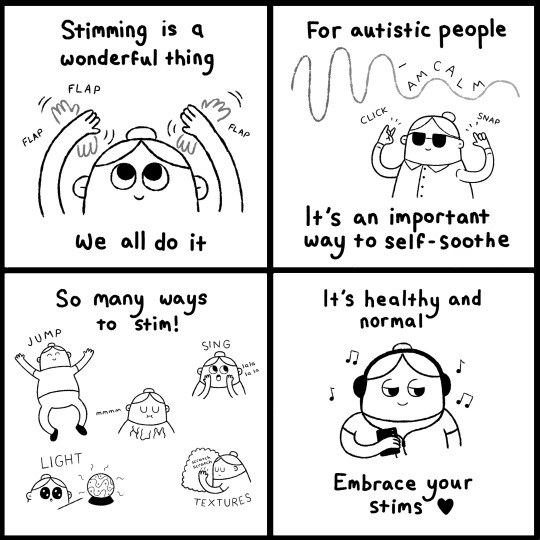
Bell Carr / Comics Youth @comicsyouth
"Do you bounce your knee when you're stressed or bored? Click your pen? Tap your fingers? These are a form of self-stimulating behaviours, known as 'stims'. They are often a repetitive movement or sound, but can take many forms involving all the senses. Everybody has stims in some way, but many autistic people rely on them as a way to self-regulate and process information in daily life.
They may do it when the environment is over or under stimulating, to relieve stress, or simply because it feels good. Some harmful therapies discourage autistic people from stimming - this is wrong and can be damaging. If a behaviour is physically dangerous or disruptive this can be redirected into a safer stim that satisfies the need for an outlet.
Never be ashamed to stim, express yourself!"
42 notes
·
View notes
Text
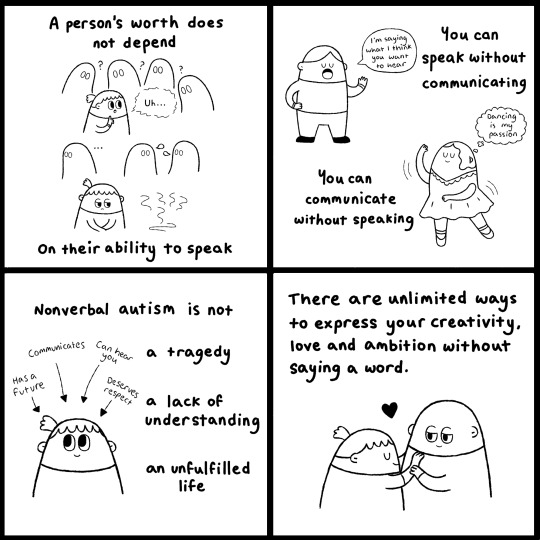
Bell Car / Comics Youth @comicsyouth
“Around 40% of autistic people are nonverbal, meaning they do not learn to speak beyond a few words or echolalia (repetition of words). A larger percentage may experience intermittent speech - meaning they cannot speak reliably all the time. They may stutter, not be able to say the words they are thinking of or lose speech entirely.
Living in a world that expects communication through spoken word in most settings, these groups are widely misunderstood. It is often assumed that someone who is unable to speak also lacks all understanding and intelligence - they may be spoken about as if they aren't there, treated like an object, expected to have no independence or ability to 'contribute'.
A person who can speak sometimes but not others may be seen as defiant, lazy, or just shy. In reality, a nonspeaking person will often know exactly what they want to say, but it is physically impossible to say the words aloud - as if there is a blockage between the brain and mouth. The feeling could be compared to trying to wiggle your ears, some people can do it but for many of us those muscles simply feel inaccessible. You can imagine how frustrating this would be if people expected you to do it on command.
When researching the experiences of nonverbal autistic people, a clear thread is found; the greatest success of the nonverbal person's life is perceived to be the day that they learn to talk. Endless inspirational stories about 'the day my autistic child said I love you', followed by mass celebration as if the child is now suddenly a real person and hasn't been expressing their love this whole time. This is a success in many ways; namely that the ability to speak will bring more acceptance from those around them and make day to day communication quicker.
But it is important to realise that a person has just as much value and potential whether they speak or not. They can still achieve amazing things even if you never hear their voice. There are many ways to communicate without saying a word. Body language, stimming, ASL, written word, picture communication cards, art, music, dance. Every individual has so much to give, if you know how to listen.”
176 notes
·
View notes
Text
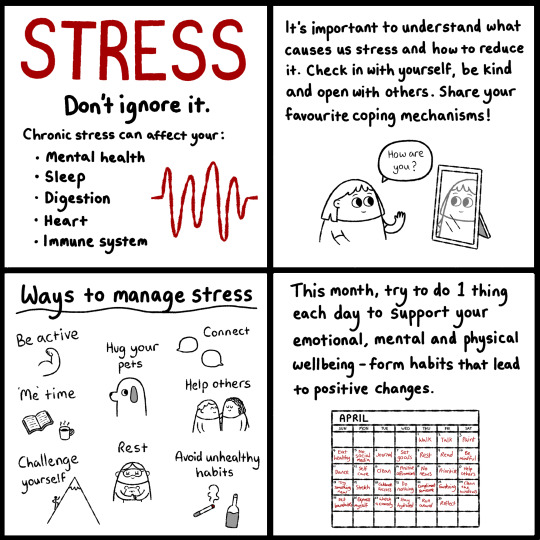
Bell Carr / Comics Youth @comicsyouth
"Take this chance to stop and reflect on stressors in your life and if there are any changes you could make to better care for yourself. Over a million young people in the UK have a diagnosable mental health problem, contributed to by long term stress as pressures from school and home have further increased during the pandemic.
Many people cover up their stress and ignore ongoing issues in the hopes it will go away, but it's important for your health to be honest with yourself and those around you. Are you taking on too much? Do you need to set boundaries? When did you last stop and acknowledge your feelings?
Daily practise of self care and reflection can develop into long term healthier coping mechanisms."
0 notes
Text
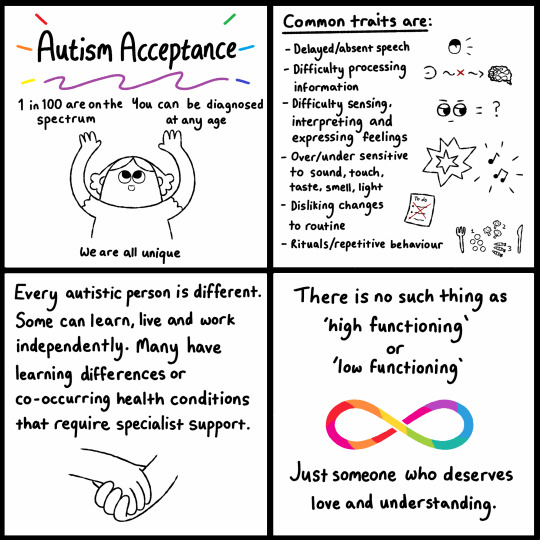
Bell Carr / Comics Youth @comicsyouth
"Autistic people are often faced with negative attitudes - as if autism is something that needs to be cured. When 'raising awareness', a puzzle piece is often used to represent it. Although some autistic people accept this, much of the community find it offensive - as it suggests that something is missing, there is a mystery to be solved, and comes across as childish. Instead you can use the rainbow infinity symbol to represent a wide spectrum.
Many also reject the use of functioning labels as they are invalidating and ableist, a person should not be reduced to their abilities. We all have strengths and weaknesses, and these fluctuate day to day. We are not machines, we are just existing.
Lastly, allistic people (not autistic) may insist that it's better to use person-first language - "person with autism". A growing number of autistic people prefer to use identity-first language - "autistic person", as autism is a part of us, not a disease."
84 notes
·
View notes